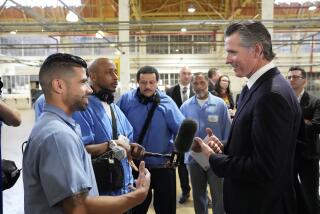Glass Partitions Separate Visitors, Inmates : When Loved Ones Are the Untouchables
MARION, Ill. — Eight plastic chairs sit vacant in separate booths. Telephones next to them are idle. The room is empty. This is visiting day at the U.S. Penitentiary at Marion.
From Thursday through Sunday, seven hours each day, the prison is open to family visitors. But the time and money it takes to get to this remote corner of southern Illinois deters many.
Others have another reason: It is just too painful.
Marion is the only federal prison in the nation that prevents inmates from touching their loved ones when they visit. Families sit in small booths with glass partitions separating them from inmates. Telephones are on each side and conversations can be monitored.
“It’s very frustrating for families,” acknowledged Warden Gary Henman. “The ones who do (visit) probably don’t come back.”
One exception is Michelle Brooks-Bey, who has made four trips from her New Jersey home to visit her husband, Charles, serving 25 years for bank robbery. The experience, she said, is emotionally draining.
“Being there three years, not being able to hold his hand or sit next to him . . . it’s demeaning,” she said in a telephone interview from her home.
She copes by ignoring her surroundings. “I block out the partitions,” she said. “I block out the noise. I block it out because I’m happy to see him.”
But, she added: “I cry all the way home.”
The no-contact program was instituted after Marion was locked down in 1983 after three fatal stabbings. Prison officials say drugs and weapons are most commonly passed to inmates in visiting rooms.
Families are allowed five visits a month. Attorneys can sit in booths without partitions, but the video part of the visit is taped.
Because conditions are so restrictive, Lawrence Daniel Caldwell, 41, a convicted bank robber, says he has told his family to stay away.
“I (could) put a photograph in front of the cell bars and talk through the phone and it would be the same thing as visiting here,” he said.
Inmate Ronnie Bruscino, who was adopted as a young child, said he saw his natural mother for the first time in more than 20 years under these conditions when she tracked him to Marion in 1982.
“She said: ‘Whatever happened to my baby boy?’ ” said Bruscino, smiling behind his thick, droopy mustache. “I started laughing. I told her, “I don’t know.’ ”
Bruscino, who has tattoos of a gorilla, a dragon and a butterfly on his arms and neck, said his mother seemed bewildered by the visiting arrangement.
“She’s just looking at the guards and she’s telling them: ‘How come you can’t put me somewhere where I can be with him?’ They tell her, ‘That don’t go around here, lady.’ ”
Since Marion inmates come from across the nation, many families can’t afford the trip. A special program, Prison Family Support, eases some of those problems by providing free transportation from town, about 10 miles away, saving a $22 round-trip cab fare, and a room for two nights each month at a local motel.
“We feel they have enough trouble getting here financially,” said Jane Otte, coordinator of the program, which is run independently of Marion. “Our whole purpose is to maintain family ties.”
She said 124 family members visited the maximum-security prison last year.
But Brooks-Bey said she hasn’t been able to persuade friends and families of other Marion inmates to accompany her.
“No one wants to go out to Marion,” she said. “Every time I go there, I’m the only one in the room.”
More to Read
Sign up for Essential California
The most important California stories and recommendations in your inbox every morning.
You may occasionally receive promotional content from the Los Angeles Times.










